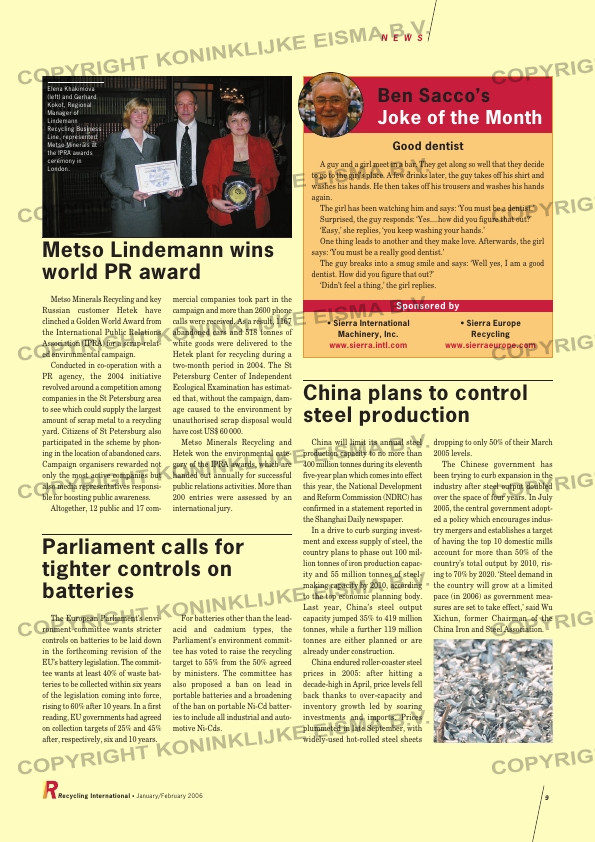Page 9 from: January / February 2006

N E W S
Recycling International • January/February 2006 9
Ben Sacco’s
Joke of the Month
Sponsored by
• Sierra International
Machinery, Inc.
www.sierra.intl.com
• Sierra Europe
Recycling
www.sierraeurope.com
Good dentist
A guy and a girl meet in a bar. They get along so well that they decide
to go to the girl’s place. A few drinks later, the guy takes off his shirt and
washes his hands. He then takes off his trousers and washes his hands
again.
The girl has been watching him and says: ‘You must be a dentist.’
Surprised, the guy responds: ‘Yes….how did you figure that out?’
‘Easy,’ she replies, ‘you keep washing your hands.’
One thing leads to another and they make love. Afterwards, the girl
says: ‘You must be a really good dentist.’
The guy breaks into a smug smile and says: ‘Well yes, I am a good
dentist. How did you figure that out?’
‘Didn’t feel a thing,’ the girl replies.
China will limit its annual steel
production capacity to no more than
400 million tonnes during its eleventh
five-year plan which comes into effect
this year, the National Development
and Reform Commission (NDRC) has
confirmed in a statement reported in
the Shanghai Daily newspaper.
In a drive to curb surging invest-
ment and excess supply of steel, the
country plans to phase out 100 mil-
lion tonnes of iron production capac-
ity and 55 million tonnes of steel-
making capacity by 2010, according
to the top economic planning body.
Last year, China’s steel output
capacity jumped 35% to 419 million
tonnes, while a further 119 million
tonnes are either planned or are
already under construction.
China endured roller-coaster steel
prices in 2005: after hitting a
decade-high in April, price levels fell
back thanks to over-capacity and
inventory growth led by soaring
investments and imports. Prices
plummeted in late September, with
widely-used hot-rolled steel sheets
dropping to only 50% of their March
2005 levels.
The Chinese government has
been trying to curb expansion in the
industry after steel output doubled
over the space of four years. In July
2005, the central government adopt-
ed a policy which encourages indus-
try mergers and establishes a target
of having the top 10 domestic mills
account for more than 50% of the
country’s total output by 2010, ris-
ing to 70% by 2020. ‘Steel demand in
the country will grow at a limited
pace (in 2006) as government mea-
sures are set to take effect,’ said Wu
Xichun, former Chairman of the
China Iron and Steel Association.
China plans to control
steel production
Metso Minerals Recycling and key
Russian customer Hetek have
clinched a Golden World Award from
the International Public Relations
Association (IPRA) for a scrap-relat-
ed environmental campaign.
Conducted in co-operation with a
PR agency, the 2004 initiative
revolved around a competition among
companies in the St Petersburg area
to see which could supply the largest
amount of scrap metal to a recycling
yard. Citizens of St Petersburg also
participated in the scheme by phon-
ing in the location of abandoned cars.
Campaign organisers rewarded not
only the most active companies but
also media representatives responsi-
ble for boosting public awareness.
Altogether, 12 public and 17 com-
mercial companies took part in the
campaign and more than 2600 phone
calls were received. As a result, 1167
abandoned cars and 518 tonnes of
white goods were delivered to the
Hetek plant for recycling during a
two-month period in 2004. The St
Petersburg Center of Independent
Ecological Examination has estimat-
ed that, without the campaign, dam-
age caused to the environment by
unauthorised scrap disposal would
have cost US$ 60 000.
Metso Minerals Recycling and
Hetek won the environmental cate-
gory of the IPRA awards, which are
handed out annually for successful
public relations activities. More than
200 entries were assessed by an
international jury.
Metso Lindemann wins
world PR award
Elena Khakimova
(left) and Gerhard
Kokot, Regional
Manager of
Lindemann
Recycling Business
Line, represented
Metso Minerals at
the IPRA awards
ceremony in
London.
Parliament calls for
tighter controls on
batteries
The European Parliament’s envi-
ronment committee wants stricter
controls on batteries to be laid down
in the forthcoming revision of the
EU’s battery legislation. The commit-
tee wants at least 40% of waste bat-
teries to be collected within six years
of the legislation coming into force,
rising to 60% after 10 years. In a first
reading, EU governments had agreed
on collection targets of 25% and 45%
after, respectively, six and 10 years.
For batteries other than the lead-
acid and cadmium types, the
Parliament’s environment commit-
tee has voted to raise the recycling
target to 55% from the 50% agreed
by ministers. The committee has
also proposed a ban on lead in
portable batteries and a broadening
of the ban on portable Ni-Cd batter-
ies to include all industrial and auto-
motive Ni-Cds.
RI_022 News 20-01-2006 09:44 Pagina 9



